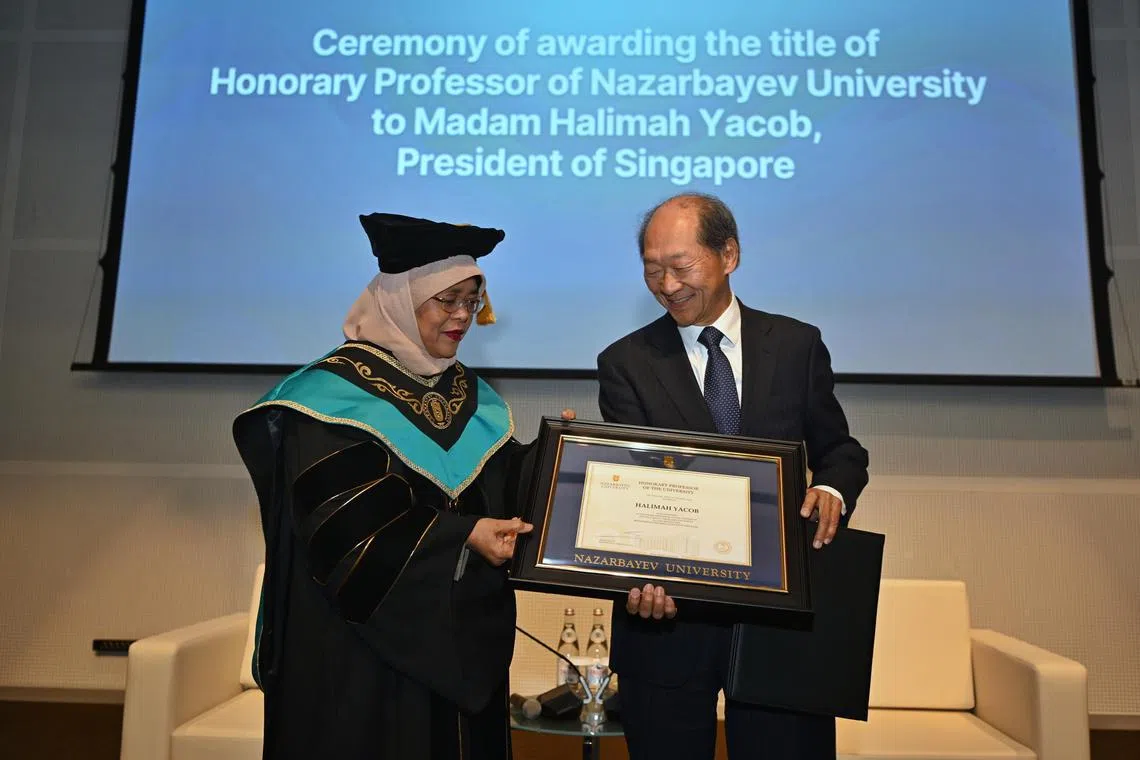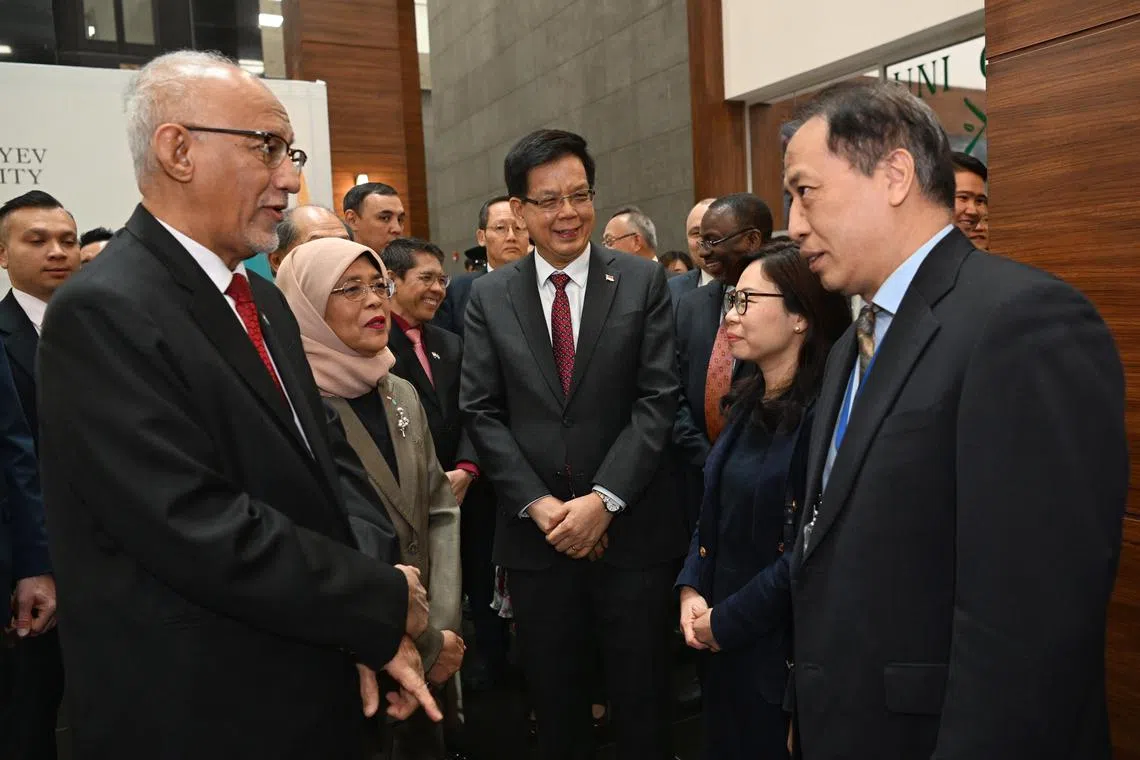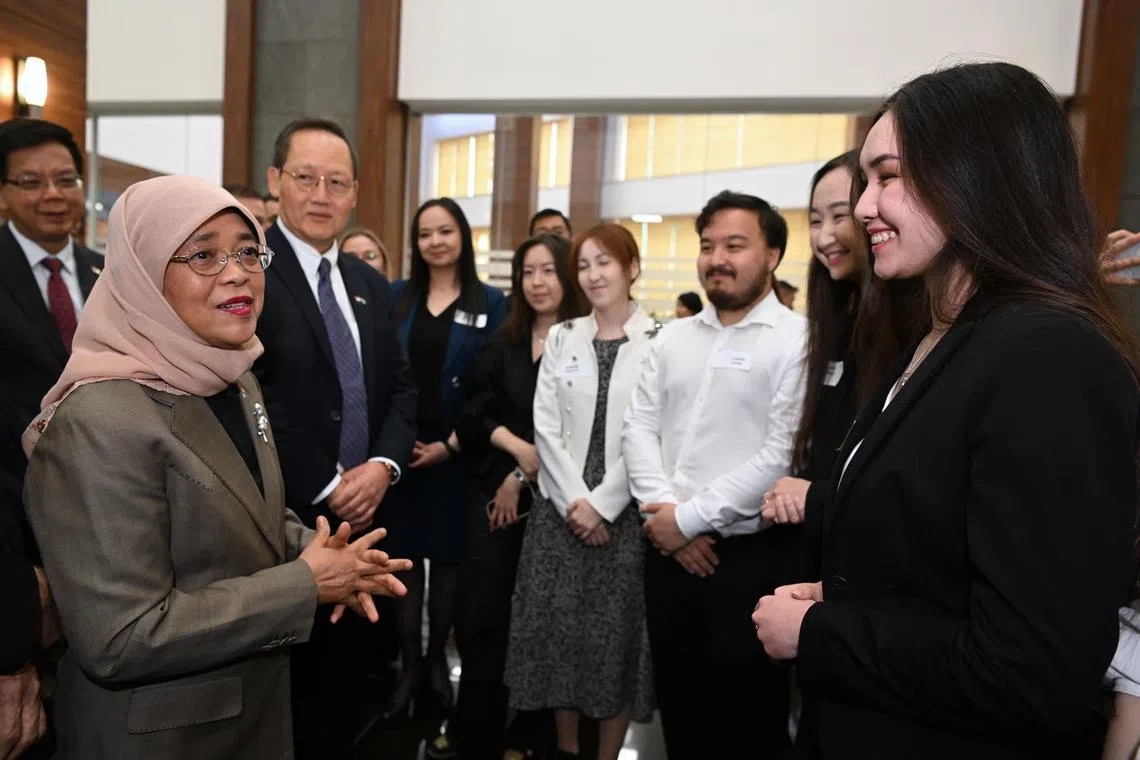S’pore, Kazakhstan can cooperate on education, women empowerment, interfaith dialogue: President Halimah
Sign up now: Get ST's newsletters delivered to your inbox

President Halimah Yacob receiving the title of Honorary Professor from Nazarbayev University president Shigeo Katsu on May 23, 2023.
ST PHOTO: CHONG JUN LIANG
Follow topic:
ASTANA, Kazakhstan – Singapore and Kazakhstan can cooperate on common challenges in education, empowering women and interfaith dialogue, said President Halimah Yacob.
On Tuesday, she highlighted the three areas that the two countries can work together on during her speech at Nazarbayev University, where she was conferred an honorary professorship.
“Despite our different national circumstances and developmental needs, there is scope for our countries to share experiences and work together on common challenges,” said Madam Halimah, who is on state visits to Kazakhstan and Uzbekistan.
On education, she said that both Singapore and Kazakhstan recognise the importance of lifelong learning and skills upgrading for adults.
Nazarbayev University, for instance, offers its students job placements with industry partners to apply their skills in real-world settings, she noted.
Madam Halimah also highlighted the close connections between Nazarbayev University and the National University of Singapore.
The current dean of Nazarbayev University’s Graduate School of Public Policy is Professor Hui Weng Tat, a Singaporean who was seconded from the Lee Kuan Yew School of Public Policy and has lived in Astana for almost eight years.
Madam Halimah encouraged more faculty and student exchanges between Singapore and Kazakhstan, saying this will “not only bring about greater people-to-people interactions, but (also) facilitate the sharing of knowledge and best practices”.

President Halimah Yacob (second from left) with her husband Mohammed Abdullah Alhabshee (left) speaking with (from centre) Nazarbayev University Graduate School of Public Policy dean Hui Weng Tat, School of Medicine clinical instructor Chan Mei Yen, and School of Engineering and Digital Sciences professor Zhao Yong.
ST PHOTO: CHONG JUN LIANG
On empowering women, she said that while almost half of Singapore’s university graduates and about 30 per cent of its parliamentarians are women – higher than the Inter-Parliamentary Union’s average of 26.1 per cent – more can and needs to be done. The Inter-Parliamentary Union is an international organisation of national Parliaments.
Madam Halimah added that the Singapore Government is working with employers and unions to strengthen fairness at the workplace,
“Beyond legislation and policies, a whole-of-society effort is needed to break gender stereotypes and shift mindsets,” she said.
Madam Halimah said she was heartened that Kazakhstan was one of the first Central Asian countries to establish a national entity to promote gender equality and increase the share of women at decision-making levels in executive, representative and judicial authorities by 2030.
“I welcome Kazakhstan to share its experience in women leadership development as this is an area of interest in Singapore too,” she added.
Another similarity that both countries share is that they are multi-ethnic and multi-religious societies, she said.
“Social stability, cohesion, the integration and inclusion of diverse backgrounds within our society are key tenets of our social harmony,” she said.
Interfaith dialogues and friendships – such as those held by the Inter-Religious Organisation
She welcomed Kazakhstan to contribute to the International Conference on Cohesive Societies, which Singapore hosted in 2019 and 2022 to promote interfaith and multicultural dialogue.
“At a time when many societies are becoming more polarised and divisive, it is even more critical to think about what unites us despite our differences, and improve the quality of our conversations, relationships and practices as we build more cohesive societies for the future,” she said.
Madam Halimah said Singapore-Kazakhstan relations date back to the Central Asian country’s pre-independence days, when founding prime minister Lee Kuan Yew first visited it in 1991. This year marks the 30th anniversary of diplomatic ties between the two countries.
There has been a healthy exchange of visits between both sides over the last three decades, and a new generation of leaders is now advancing the relationship, she added.
On Monday, Madam Halimah called on Kazakhstan President Kassym-Jomart Tokayev, and the leaders reaffirmed the warm and longstanding relations
President Tokayev is no stranger to Singapore, having served as a diplomat in the 1970s, she said.
She added that she welcomed his interest and efforts in fostering stronger exchanges between Central Asia and Asean.
“Our two regions are part of a broader Asia, and we share a common interest in promoting peace and stability, without which economic growth and development cannot take place,” she said.
“It is also in our interest to work towards an open and inclusive regional architecture where all countries, big or small, have equal rights and can settle disputes peacefully.”

(From left) President Halimah Yacob and Manpower Minister Tan See Leng speaking to students at the Nazarbayev University on May 23, 2023.
ST PHOTO: CHONG JUN LIANG
After the lecture, Madam Halimah met some students, toured the university and was hosted to lunch by Nazarbayev University president Shigeo Katsu.
She travelled to Tashkent in Uzbekistan on Tuesday evening for the next leg of her state visits.


